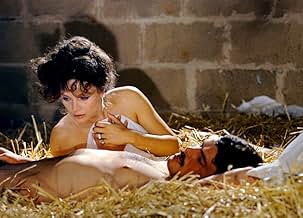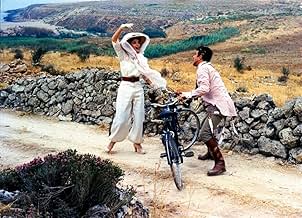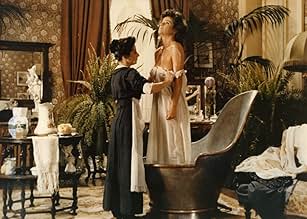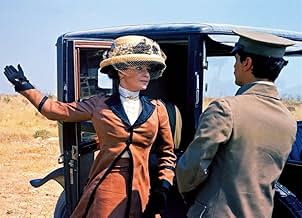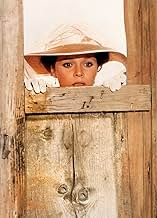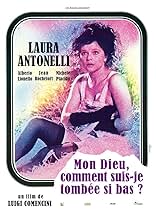La marquise Eugenia di Maqueda, orpheline élevée par des religieuses, épouse Raimondo Corrao, mais le soir de leur mariage, elle découvre qu'il est son frère.La marquise Eugenia di Maqueda, orpheline élevée par des religieuses, épouse Raimondo Corrao, mais le soir de leur mariage, elle découvre qu'il est son frère.La marquise Eugenia di Maqueda, orpheline élevée par des religieuses, épouse Raimondo Corrao, mais le soir de leur mariage, elle découvre qu'il est son frère.
- Prix
- 1 victoire et 1 nomination au total
Rosemary Dexter
- Floridia di Maqueda
- (as Rosemarie Dexter)
Toni Luigi Arceri
- Soldato Siciliano
- (uncredited)
Renato Marzano
- Croupier
- (uncredited)
Luigi Tasca
- Train Controller
- (uncredited)
Avis en vedette
After the über-success of 1973's "Malizia", Laura Antonelli was a top star in Italy and considered as the new Sophia Loren. Yet her following movies – "Sessomatto", "Peccato Veniale", "Simona" – were average at best. Then came the 1974 "Mio Dio come sono caduta in basso", a definite highlight of her career in comedy and a small step towards the world of the auteur cinema. In fact, this works so well that she would resume similar roles in "L'innocente" and "Mogliamante".
Set between the early 1900s and 1920, we follow the life of the Sicilian noblewoman Eugenia. Raised in a convent, all of a sudden a marriage to the nutty Lord Raymondo is arranged. The wedding night turns into a disaster: Not just that Eugenia has no idea about sex beyond some mysterious temptation of the flesh, Raymondo receives an information saying that he and Eugenia are actually brothers and sisters! To prevent any damage for the house, Raymondo decides to keep it a secret. So they both play husband and wife. But already on the honeymoon trip to Paris, the beautiful girl is flirted at and gets seduced constantly, and soon, tormented and miserable, the temptation of the flesh becomes unbearable
Let's face it: The general premise with the brother and the sister is hard to swallow. Even though the writers were well aware of that and explain it in detail: what a huge coincidence. But once it's taken for granted, this becomes an ingenious and unique vehicle for hilarious comedy. Eugenia, a complete newcomer to anything beyond God and the Bible, suddenly confronted with sensuality, intimacy, desire. She knows she wants it, she needs it, but she doesn't even understand it, she is not capable of it. She doesn't know why she should undress on the wedding night, she'll immediately faint when one says a certain word, she'll scream in horror when she sees a nude man for the first time (and will faint again, of course). While deeply caught in her churchy morale, she'll constantly cry "no!", "never!", "have mercy!", but at the same time you see her trembling lips, her thirsty eyes, her body pumping, actually saying "YES!!!". But the only man she feels the right to be with is her husband and that's her brother, so it's out of the question.
This may sound like Eugenia is hard to bear, but that is definitely not the case. It is actually an incredibly bitter, crushing situation, and any viewer with a heart must immediately fall for this so beautiful, yet so sad girl. And in spite of all that tragedy, the script manages to keep a high pace and is funny throughout. The situations are awkward, for instance, you'll see the longest, un-sexiest and funniest striptease scenes ever (including three times full frontal Laura nudity). She wants to commit suicide, but doesn't know how. She desperately seeks the help of her church, but the priests don't see her problem. Finally she'll subject to sexual adventures, enjoying it while it lasts, but being disgusted afterwards. In general, all the scenes with Eugenia and her driver are a true delight, especially when they enter the hayrick. Laura Antonelli is fantastic, just perfect for the part. In my opinion she always excels when being innocent, romantic, somewhat sad and mistreated, and not in her more flashy, alluring, sexy roles. The face of an angel, the body of a sinner. And she is very talented for well-written comedy.
And of course, Alberto Lionello as Raymondo is a great counterpart for Laura. A total buffoon, easy to influence, easy to distract, easy to inspire – a pain in the ass but funny as hell. He is also the script's entrance to provide snappy satire about Italian nationalism, imperialism and social conventions of the time. Everybody is obsessed with the works of Gabriele d'Annunzio, the (involuntary) forerunner of Italian fascism. These elements grow stronger in the last third of the movie, pushing the comedy more and more in the background. And at the same time, the subtle, underlying sad mood for our Eugenia grows stronger. This all culminates in the breakout of the World War.
Overall "Mio Dio come sono caduta in basso" tells a unique, tragicomic story with strong social criticism, along with hilarious comedy and an endlessly lovable main character. It is highly recommended for Laura Antonelli fans, but also for anybody looking for a great period dramedy with clear overweight of the comedy.
Set between the early 1900s and 1920, we follow the life of the Sicilian noblewoman Eugenia. Raised in a convent, all of a sudden a marriage to the nutty Lord Raymondo is arranged. The wedding night turns into a disaster: Not just that Eugenia has no idea about sex beyond some mysterious temptation of the flesh, Raymondo receives an information saying that he and Eugenia are actually brothers and sisters! To prevent any damage for the house, Raymondo decides to keep it a secret. So they both play husband and wife. But already on the honeymoon trip to Paris, the beautiful girl is flirted at and gets seduced constantly, and soon, tormented and miserable, the temptation of the flesh becomes unbearable
Let's face it: The general premise with the brother and the sister is hard to swallow. Even though the writers were well aware of that and explain it in detail: what a huge coincidence. But once it's taken for granted, this becomes an ingenious and unique vehicle for hilarious comedy. Eugenia, a complete newcomer to anything beyond God and the Bible, suddenly confronted with sensuality, intimacy, desire. She knows she wants it, she needs it, but she doesn't even understand it, she is not capable of it. She doesn't know why she should undress on the wedding night, she'll immediately faint when one says a certain word, she'll scream in horror when she sees a nude man for the first time (and will faint again, of course). While deeply caught in her churchy morale, she'll constantly cry "no!", "never!", "have mercy!", but at the same time you see her trembling lips, her thirsty eyes, her body pumping, actually saying "YES!!!". But the only man she feels the right to be with is her husband and that's her brother, so it's out of the question.
This may sound like Eugenia is hard to bear, but that is definitely not the case. It is actually an incredibly bitter, crushing situation, and any viewer with a heart must immediately fall for this so beautiful, yet so sad girl. And in spite of all that tragedy, the script manages to keep a high pace and is funny throughout. The situations are awkward, for instance, you'll see the longest, un-sexiest and funniest striptease scenes ever (including three times full frontal Laura nudity). She wants to commit suicide, but doesn't know how. She desperately seeks the help of her church, but the priests don't see her problem. Finally she'll subject to sexual adventures, enjoying it while it lasts, but being disgusted afterwards. In general, all the scenes with Eugenia and her driver are a true delight, especially when they enter the hayrick. Laura Antonelli is fantastic, just perfect for the part. In my opinion she always excels when being innocent, romantic, somewhat sad and mistreated, and not in her more flashy, alluring, sexy roles. The face of an angel, the body of a sinner. And she is very talented for well-written comedy.
And of course, Alberto Lionello as Raymondo is a great counterpart for Laura. A total buffoon, easy to influence, easy to distract, easy to inspire – a pain in the ass but funny as hell. He is also the script's entrance to provide snappy satire about Italian nationalism, imperialism and social conventions of the time. Everybody is obsessed with the works of Gabriele d'Annunzio, the (involuntary) forerunner of Italian fascism. These elements grow stronger in the last third of the movie, pushing the comedy more and more in the background. And at the same time, the subtle, underlying sad mood for our Eugenia grows stronger. This all culminates in the breakout of the World War.
Overall "Mio Dio come sono caduta in basso" tells a unique, tragicomic story with strong social criticism, along with hilarious comedy and an endlessly lovable main character. It is highly recommended for Laura Antonelli fans, but also for anybody looking for a great period dramedy with clear overweight of the comedy.
Convent-reared Sicilian Laura Antonelli is wed to equally Sicilian Alberto Lionello. Before they can consummate the marriage, they discover they are actually sister and brother. Appalled, but unwilling to admit the shame, they agree to live together, but never touch each other. However, Miss Antonelli, despite her prudish upbringing, feels the constant call of the flesh.
Luigi Comencini's sex comedy is set in 1908 through 1920, so there are references to Gabriele D'Annunzio's erotic work. Yet in the words of the character played by Michele Placido, the chauffeur who seduces Miss Antonelli, everyone is confused by words; the deed is simple and natural. In the midst of all the sniggering and high-flown talk set around the lack of anything to talk about, there are a couple of good comic sequences, and Lionello is quite funny, but mostly it's all about the stupidity.
Luigi Comencini's sex comedy is set in 1908 through 1920, so there are references to Gabriele D'Annunzio's erotic work. Yet in the words of the character played by Michele Placido, the chauffeur who seduces Miss Antonelli, everyone is confused by words; the deed is simple and natural. In the midst of all the sniggering and high-flown talk set around the lack of anything to talk about, there are a couple of good comic sequences, and Lionello is quite funny, but mostly it's all about the stupidity.
Even if there is no sex. Isn't it? Well, that's pretty much what happens in the film. Until Eugenia, the character played by the unique beauty that was Laura Antonelli, meets Silvano, the character played by Michele Placido. What a beauty of a woman this Laura Antonelli is, I consider her the most beautiful woman in the world, more beautiful than all the beautiful actresses, like other Italians I have been in love with more or less, Virna Lisi, Monica Vitti, Sylva Koscina, Silvana Mangano, Anonella Lualdi, Rossana Podestà, Sophia Loren, Monica Bellucci, Claudia Cardinale, Gina Lollobrigida, Ornella Muti, Stefania Sandrelli. The film is worth seeing just for her. A little for Michele Placido and Jean Rochefort too. Alberto Lionello's acting is too exaggerated. The talented director Luigi Comencini also delighted me with other films such as: "The Scopone Game Original title: Lo scopone scientifico (1972) and "Misunderstood" Original title: Incompreso (Vita col figlio) (1966). The 10 stars are less for the film than for Laura Antonaz, known as Antonelli.
I've seen this movie 4 or 5 times. It is great and very funny! I like all actors very much especially Laura Antonelli and Jean Rochefort. This movie is kind of the parody. Sometimes it reminds me the style of Jane Austen parodies. This is about the "women decorum" or how a woman has to behave with a man in the beginning of XX century.
Laura Antonelli brings whole new dimensions to the word "luscious" in this movie. She makes the seemingly stock character of the barely-reluctant virgin come alive in her scenes with Placido, thanks to her big eyes and adorably trembling lower lip. And then there's that body...
In addition, "Marriage" has a lot of wry commentary on Italy of the early 1900s. The upper class were a ragingly nationalist bunch not unlike some sectors of the U.S. populace today. (It helps the enjoyment of the film if one knows who Gabriele d'Annunzio was.) A conscript's baleful response to a officer's 'fire them up' speech is the funniest line of the film, one I haven't forgotten.
I saw this in a little independent theatre, and went back for a second helping. If you can find this one on video, rent it!
In addition, "Marriage" has a lot of wry commentary on Italy of the early 1900s. The upper class were a ragingly nationalist bunch not unlike some sectors of the U.S. populace today. (It helps the enjoyment of the film if one knows who Gabriele d'Annunzio was.) A conscript's baleful response to a officer's 'fire them up' speech is the funniest line of the film, one I haven't forgotten.
I saw this in a little independent theatre, and went back for a second helping. If you can find this one on video, rent it!
Le saviez-vous
- ConnexionsReferenced in Only in Theaters (2022)
Meilleurs choix
Connectez-vous pour évaluer et surveiller les recommandations personnalisées
- How long is Till Marriage Do Us Part?Propulsé par Alexa
Détails
- Date de sortie
- Pays d’origine
- Langue
- Aussi connu sous le nom de
- Till Marriage Do Us Part
- Lieux de tournage
- Noto, Syracuse, Sicily, Italie(town in Sicily)
- société de production
- Consultez plus de crédits d'entreprise sur IMDbPro
- Durée1 heure 50 minutes
- Mixage
- Rapport de forme
- 1.85 : 1
Contribuer à cette page
Suggérer une modification ou ajouter du contenu manquant

